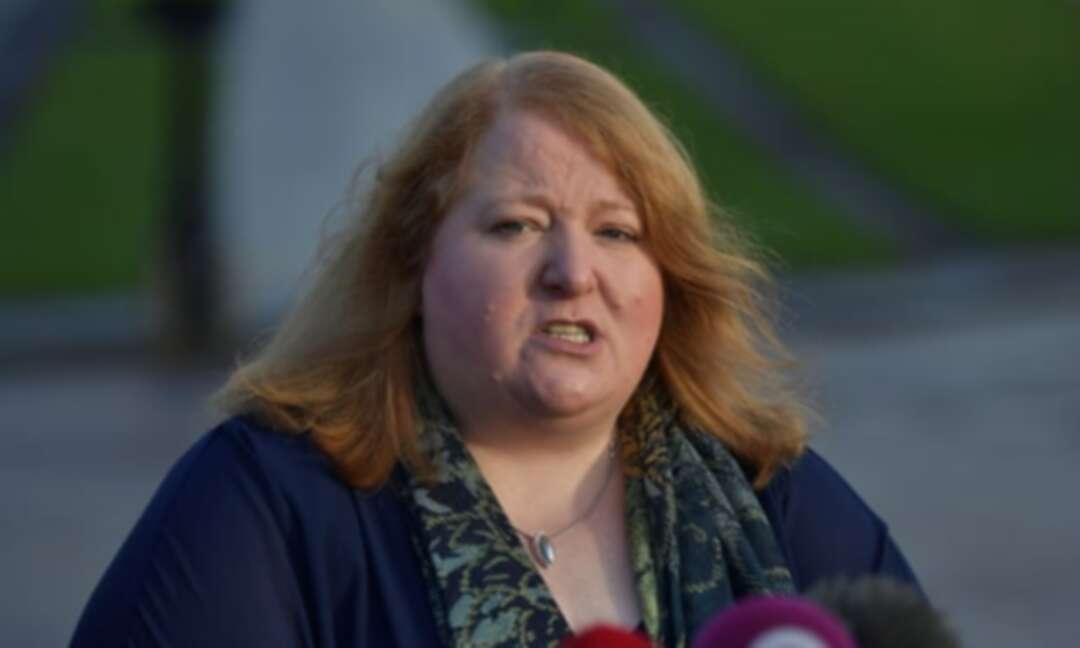-
Dishonesty’ over Brexit fuelled loyalist anger, says Stormont minister

Justice minister Naomi Long points finger at UK ministers after four nights of street violence in Northern Ireland
Northern Ireland’s justice minister has said the government’s “dishonesty” over the consequences of hard Brexit has contributed to the anger felt by loyalists, as police counted the cost of 41 officers injured during violence on the streets over four nights.
Naomi Long’s remarks came as tensions escalated in Northern Ireland, with the first minister and Democratic Unionist party leader, Arlene Foster, hitting out at the “arrogance of Sinn Féin” and telling the BBC the IRA council still existed.
Long attributed the violence to a combination of loyalist protests over police success in cracking down on paramilitary gangs and disquiet she says has been stoked by Westminster leaders’ false rhetoric over Brexit.
In a swipe at both Boris Johnson, who claimed there would be no checks on goods crossing the Irish Sea, and the Northern Ireland secretary, Brandon Lewis, who said no border would be erected following Brexit, she said the government knew Brexit would be “felt most acutely in Northern Ireland, where identity issues are tied up with border issues”.
She told the BBC Radio 4 Today programme: “Instead of trying to work through the issues legally, it opted to promote lawlessness by suspending the Northern Ireland protocol.
“They promised people unfettered access, which is not the case. And they denied the existence of borders, even as those borders were being erected. I think that that dishonesty, and the lack of clarity around these issues has contributed to a sense of anger in parts of our community.”
“We have to recognise, and this is fundamental, that when we decided that Brexit was the way forward, and when we choose a particularly hard Brexit, that there would be consequences. And those consequences would be felt most acutely in Northern Ireland, where there is some land border,” she added.
She said it was “horrifying to see children” involved in the violence that spilled out into the streets over four nights in Derry and Carrickfergus near Belfast but that anger against Brexit was not the only contributing factor.
The issues of Brexit and violence in recent days has heightened tensions with the Stormont assembly, which is to be recalled from recess on Thursday to discuss the disturbances.
On Wednesday morning, Foster criticised the “arrogance” and “hypocrisy” of Sinn Féin condemning the violence when the IRA had subjected to “a campaign of violence for 40 years”.
She also repeated her call for the Police Service of Northern Ireland chief constable, Simon Byrne, to resign in the wake of the decision by prosecution authorities not to pursue Sinn Féin leaders who attended a mass funeral during lockdown.
“He has completely lost the confidence not just of the unionist community but all the community,” she said, arguing that the police had “facilitated” the funeral of the IRA volunteer Bobby Storey last June, which the PSNI has denied.
“There is a feeling within loyalism that there is a political elite and Sinn Féin, they are untouchable, and that is something that is very concerning if you believe that the rule of law,” Foster said, adding that she had been told by “security sources” that the IRA council still existed.
She said 17,000 people had died in Northern Ireland in the last year and all their families had to abide by strict coronavirus lockdown guidelines, unable to hold large funerals typical in Ireland.
source: Lisa O'Carroll
Levant
You May Also Like
Popular Posts
Caricature
BENEFIT Sponsors BuildHer...
- April 23, 2025
BENEFIT, the Kingdom’s innovator and leading company in Fintech and electronic financial transactions service, has sponsored the BuildHer CityHack 2025 Hackathon, a two-day event spearheaded by the College of Engineering and Technology at the Royal University for Women (RUW).
Aimed at secondary school students, the event brought together a distinguished group of academic professionals and technology experts to mentor and inspire young participants.
More than 100 high school students from across the Kingdom of Bahrain took part in the hackathon, which featured an intensive programme of training workshops and hands-on sessions. These activities were tailored to enhance participants’ critical thinking, collaborative problem-solving, and team-building capabilities, while also encouraging the development of practical and sustainable solutions to contemporary challenges using modern technological tools.
BENEFIT’s Chief Executive Mr. Abdulwahed AlJanahi, commented: “Our support for this educational hackathon reflects our long-term strategic vision to nurture the talents of emerging national youth and empower the next generation of accomplished female leaders in technology. By fostering creativity and innovation, we aim to contribute meaningfully to Bahrain’s comprehensive development goals and align with the aspirations outlined in the Kingdom’s Vision 2030—an ambition in which BENEFIT plays a central role.”
Professor Riyadh Yousif Hamzah, President of the Royal University for Women, commented: “This initiative reflects our commitment to advancing women in STEM fields. We're cultivating a generation of creative, solution-driven female leaders who will drive national development. Our partnership with BENEFIT exemplifies the powerful synergy between academia and private sector in supporting educational innovation.”
Hanan Abdulla Hasan, Senior Manager, PR & Communication at BENEFIT, said: “We are honoured to collaborate with RUW in supporting this remarkable technology-focused event. It highlights our commitment to social responsibility, and our ongoing efforts to enhance the digital and innovation capabilities of young Bahraini women and foster their ability to harness technological tools in the service of a smarter, more sustainable future.”
For his part, Dr. Humam ElAgha, Acting Dean of the College of Engineering and Technology at the University, said: “BuildHer CityHack 2025 embodies our hands-on approach to education. By tackling real-world problems through creative thinking and sustainable solutions, we're preparing women to thrive in the knowledge economy – a cornerstone of the University's vision.”
opinion
Report
ads
Newsletter
Subscribe to our mailing list to get the new updates!






















